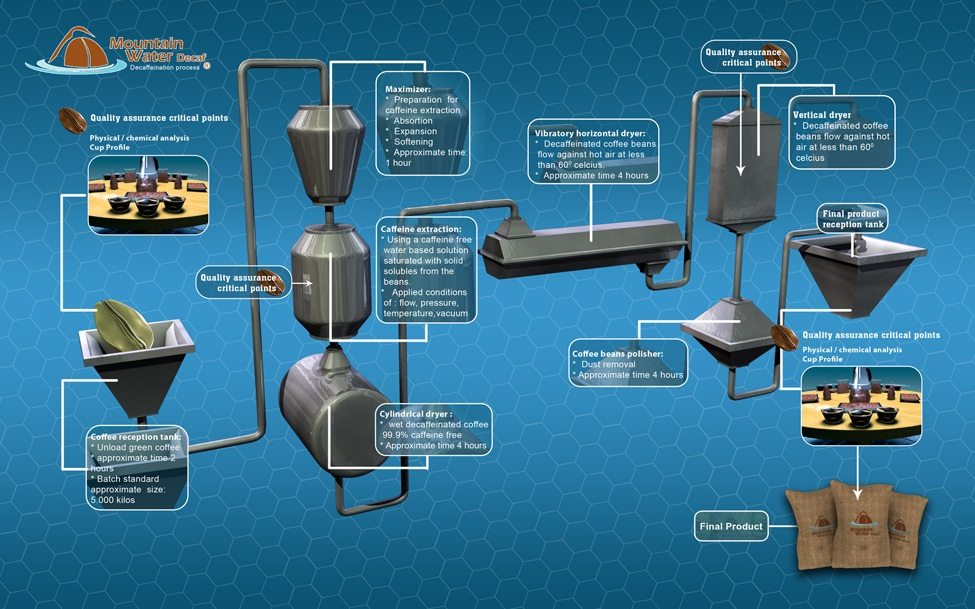What is the difference between Swiss Water Process and Mountain Water Process decaf?
Both Swiss Water Process and Mountain Water Process are methods used to decaffeinate coffee beans without the use of chemical solvents like methylene chloride or ethyl acetate, which are commonly used in other decaffeination processes. The key difference between these two methods lies in their origin and the specific technology used:
Swiss Water Process
- Origin: The Swiss Water Process was developed in Switzerland in the 1930s.
- Process: In the Swiss Water Process, green (unroasted) coffee beans are soaked in hot water to dissolve the caffeine. This water becomes saturated with coffee solubles, including caffeine. The beans are then discarded, and the water is passed through a specialised carbon filter. This filter selectively removes caffeine molecules while retaining coffee flavour compounds. The resulting caffeine-free water is then used to decaffeinate a new batch of beans, which will not lose their flavour characteristics.
- Additional Info: SWP is considered an environmentally friendly and natural method because it doesn’t involve the use of synthetic chemicals. It relies on solubility and osmosis to remove caffeine while preserving the coffee’s flavour profile.
Mountain Water Process
- Origin: The Mountain Water Process is a variation of the Swiss Water Process and was developed in Mexico.
- Process: In the Mountain Water Process, the green coffee beans are soaked in pure, glacial mountain water from the Pico de Orizaba mountain in Mexico. This water is used to dissolve the caffeine in the beans. Similar to the Swiss Water Process, the water is then passed through carbon filters to remove the caffeine while retaining the coffee’s flavour compounds.
- Additional Info: The use of pure mountain water from a specific source is the primary distinction of the Mountain Water Process. This process is also considered chemical-free and gentle on the beans, preserving their flavour.

What are some other decaffination processes?
In addition to Swiss Water Process and Mountain Water Process, there are several other decaffeination methods used in the coffee industry. Some of the most common ones include:
Direct Solvent-Based Processes
Methylene Chloride Process: This method involves soaking coffee beans in a solvent called methylene chloride, which selectively bonds with caffeine. The solvent is then separated, and the beans are steamed to remove any remaining traces. Methylene chloride is considered safe when used within regulatory limits, but some prefer solvent-free methods.
Ethyl Acetate Process: Ethyl acetate, often derived from natural sources like fruit, is another solvent used to remove caffeine from coffee beans. The process is similar to the methylene chloride method and is considered safe when used properly.
Indirect Solvent-Based Processes
Natural Decaffeination: In this method, the coffee beans are soaked in hot water to extract caffeine and flavour compounds. The water is then separated and mixed with a solvent like ethyl acetate or methylene chloride to remove the caffeine. Finally, the decaffeinated water is reintroduced to the beans to reabsorb the flavour compounds.
Carbon Dioxide (CO2) Process
In the CO2 decaffeination process, carbon dioxide in its supercritical state is used as a solvent. Coffee beans are soaked in compressed CO2, which binds with the caffeine molecules. The CO2 is then depressurized, causing it to return to a gaseous state and leaving the caffeine behind. This method is chemical-free and preserves coffee flavours well.
Triglyceride Process (Sugar Cane Process)
This method uses a solution of water, sugar cane, and ethyl acetate to remove caffeine. The solution is applied to the beans, and the caffeine bonds with the ethyl acetate in the mixture. The solvent is then separated, and the beans are steamed to remove any remaining traces.
Each decaffeination process has its advantages and potential drawbacks. The choice of method can influence the flavour, aroma, and environmental impact of decaffeinated coffee. Many coffee producers and consumers prefer methods like Swiss Water, Mountain Water, or CO2 process for their natural and chemical-free characteristics, as they tend to preserve the coffee’s original flavour profile more effectively.



